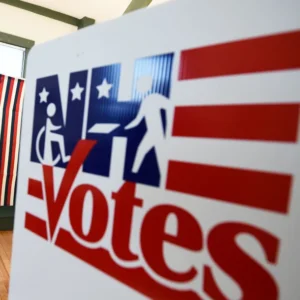A second version of a bill to bump New Hampshire’s last-in-the-nation state primary from September to June passed in a party-line vote by the House Election Law Committee Tuesday, making an election calendar change all but certain,.
The only questinos remaining, according to committee Chairman Rep. Ross Berry (R-Weare), is whether lawmakers will push for the law to take effect starting in 2026 or 2028.
“I’m not ready to take 2026 off the table yet,” said Berry.
Democrats have made their position clear: They don’t want the law to take effect until after the 2026 campaign season. That version of the legislation has already passed the House. Tuesday’s vote was for a bill with an effective date of January 1, 2026.
The state’s current September primary date, leaving less than two months before the November general election, is widely viewed as a form of incumbent protection. Democrats have long supported the late primary because their incumbents are less likely to face serious primary challenges than their GOP counterparts.
In fact, no incumbent New Hampshire Democrat has ever lost a federal or statewide primary.
Granite State Republicans, on the other hand, have a robust primary tradition. In 2002, incumbent U.S. Sen. Bob Smith was defeated in the GOP primary by U.S. Rep. John E. Sununu, who went on to defeat future Democratic U.S. Sen. Jeanne Shaheen.
Meanwhile, in accordance with current state law, the primary falls on the second Tuesday in September. In 2026, that date will be Sept. 8 — the day after Labor Day — and just eight weeks before the Nov. 3 general election.
The Senate bill now heads to the House for a vote.
“We already passed June for 2028, the question now is will we want to do it in 2026 to give our candidates a fighting chance,” Berry told NHJournal, referencing similar legislation that cleared the House earlier this spring.
But would it matter? Although the filing period won’t open for more than a year, 2026 is shaping up to be a quiet primary cycle.
Now that U.S. Rep. Maggie Goodlander has decided not to enter the race, U.S. Rep. Chris Pappas is heavily favored to be the Democratic nominee to replace retiring Shaheen. On the Republican side, former ambassador and Massachusetts U.S. Sen. Scott Brown appears to have the field to himself at present.
In the race for governor, which should be competitive given New Hampshire’s purple politics, first-term Republican Ayotte isn’t likely to get a GOP primary challenger. And Democrats don’t have a single rumored candidate yet, much less two.
Good-government advocates have complained about the Granite State’s late primary date for years, to no avail. The closest New Hampshire has come to moving away from a post-Labor Day state primary was in 2021 when a proposal to move the date into August made its way to former Gov. Chris Sununu’s desk. Critics, including then-Secretary of State William Gardner, argued, however, that holding the primary amid August’s summer vacation doldrums would depress voter turnout.
Sununu, who vetoed the bill, agreed.
“New Hampshire’s elections are the gold standard for the rest of the country,” Sununu said. “Our primary date schedule has stood the test of time.”
Yet fast-forward to 2025, and Secretary of State David Scanlan’s testimony in support of an August vs. June primary date.
Some of his concerns with a June primary include the fact that it would shift candidate filing deadlines to March, the height of town meeting season, putting pressure on local officials during what is typically already a busy time.
Scanlan also noted that a June primary could spark discussions about extending the governor’s term to four years to avoid the potential for reelection campaigns beginning immediately after inauguration day.
Last year, Democrats who opposed the date change also complained of a “nonstop election season.” This year, however, more Democrats have gotten on board with a June primary shift. The legislation approved by the full House in March features state Rep. Kris Schultz (D-Concord) as the lead sponsor.
That proposal succeeded in part due to a compromise amendment Berry introduced that keeps any change to June from being implemented ahead of the 2026 election cycle.
If New Hampshire moves its primary up to June, it would join 14 other states, including Washington, D.C., and Puerto Rico.





